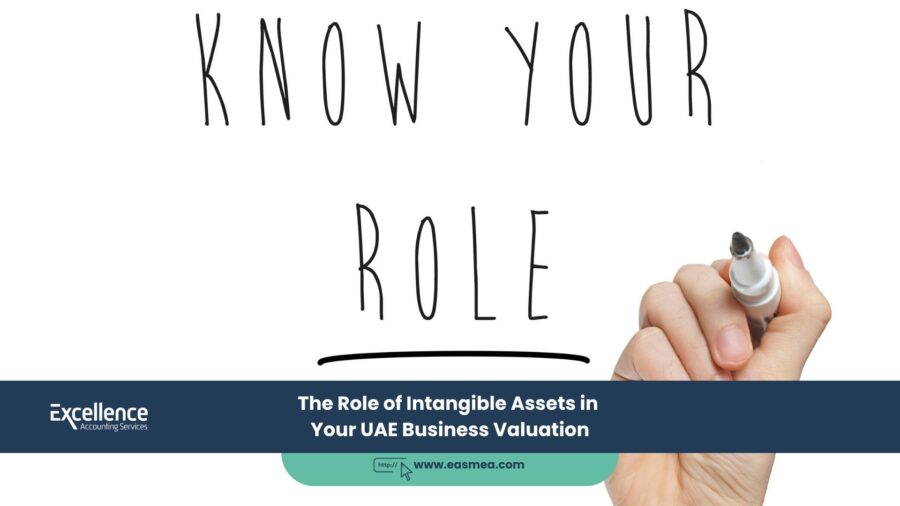The Role of Intangible Assets in Your UAE Business Valuation
When you think about the value of a business, what comes to mind? For many, it’s the tangible, physical things: buildings, machinery, inventory, and cash in the bank. For decades, these “tangible assets” were the primary drivers of a company’s worth. But in the modern, knowledge-based economy of the UAE, this view is dangerously incomplete. Today, a significant portion—often the majority—of a company’s true value lies in its intangible assets.
- The Role of Intangible Assets in Your UAE Business Valuation
- What Are Intangible Assets?
- Key Categories of Intangible Assets
- How Are Intangible Assets Valued?
- The Impact of UAE Corporate Tax on Intangible Asset Valuation
- Uncover the Hidden Value in Your Business with EAS
- Frequently Asked Questions (FAQs)
- Do You Know the True Value of Your Business?
Intangible assets are the non-physical drivers of a company’s success. They are the power of your brand name, the loyalty of your customer base, the innovation locked in your patents, and the efficiency of your proprietary software. In a service-driven and brand-conscious market like the UAE, these assets are not just “nice to have”; they are the very essence of a company’s competitive advantage and future earning potential. Ignoring them during a business valuation is like trying to determine the value of a smartphone by only weighing its plastic and metal casing.
This guide will illuminate the critical role of intangible assets in determining the true worth of your UAE business. We will define what they are, explore the different methods used to value them, and explain how the new UAE Corporate Tax regime has made understanding their value more important than ever.
Key Takeaways
- Value Has Shifted from Physical to Non-Physical: For most modern businesses, intangible assets like brand, data, and IP are more valuable than tangible assets.
- Intangibles Drive Future Earnings: A strong brand commands higher prices, loyal customers ensure recurring revenue, and proprietary tech creates a competitive moat. These all translate to higher future cash flows.
- Valuation Requires Specialized Methods: Intangibles cannot be valued by looking at a balance sheet. They require specific valuation approaches like the Relief from Royalty or Multi-Period Excess Earnings methods.
- Corporate Tax Makes Intangibles More Valuable: The ability to amortize (deduct the cost of) acquired intangible assets creates a significant “tax shield” that adds quantifiable value to a business.
- Ignoring Intangibles Leads to Undervaluation: Failing to identify and value your intangible assets will result in a significantly lower and inaccurate business valuation, whether for a sale, fundraising, or strategic planning.
What Are Intangible Assets?
An intangible asset is a non-physical asset that has a demonstrable value and is expected to generate future economic benefits for a company. Unlike tangible assets, you can’t touch them, but you can certainly feel their impact on the bottom line.
| Tangible Assets (Physical) | Intangible Assets (Non-Physical) |
|---|---|
| Office buildings, warehouses | Brand name and reputation |
| Computers, machinery, vehicles | Patents, trademarks, copyrights |
| Inventory, raw materials | Customer lists and relationships |
| Cash, furniture, fixtures | Proprietary software and databases |
In the 21st-century economy, a company’s most valuable assets often walk out the door every evening in the minds of its employees or exist as lines of code on a server. A proper valuation must capture this reality.
Key Categories of Intangible Assets
To better understand their scope, intangible assets can be grouped into several key categories:
- Marketing-Related: These assets are used to market or promote products and services. This is arguably the most important category for many UAE businesses. Examples include brand names (e.g., Emaar, Emirates), trademarks, and internet domain names.
- Customer-Related: These assets arise from relationships with customers. Examples include customer lists, contractual relationships, and customer loyalty programs. A business with a large, recurring customer base is inherently more valuable.
- Technology-Based: These assets are rooted in technological innovation. Examples include patented technology, proprietary software code, trade secrets (like a secret recipe), and technical know-how.
- Contract-Based: These assets represent value arising from legal agreements. Examples include licensing and royalty agreements, franchise agreements, and favorable supplier or lease contracts.
- Artistic-Related: These assets arise from the right to artistic works. The most common example is copyright protection for literary works, music, or films.
How Are Intangible Assets Valued?
Valuing something you can’t see or touch is a complex process that requires specialized expertise. Professional valuers use several established methods, often in combination.
1. The Market Approach
This approach values an intangible asset by looking at recent transactions for similar assets in the open market. While straightforward, it can be difficult to apply in practice because truly comparable, publicly-disclosed transactions for unique assets like brands or patents are rare.
2. The Cost Approach
This method values an asset based on the cost it would take to recreate it from scratch. For example, the value of a piece of software could be estimated by calculating the developer hours and other costs required to build a similar system. This approach often sets a “floor” value but can fail to capture the full economic potential of the asset.
3. The Income Approach
This is the most commonly used and most powerful approach. It values an intangible asset based on the future income it is expected to generate. There are several methods under this approach:
- Relief from Royalty Method: Often used for brands and patents. It asks: “If we didn’t own this brand, how much would we have to pay a third party in royalties to license it?” The present value of these hypothetical royalty payments represents the value of the brand.
- Multi-Period Excess Earnings Method (MPEEM): Often used to value customer relationships. It projects the future profits expected from the existing customer base and then subtracts charges for the other assets (like working capital and fixed assets) that contribute to those earnings. What’s left is the “excess earnings” attributable solely to the customer relationships.
The Impact of UAE Corporate Tax on Intangible Asset Valuation
The introduction of Corporate Tax has a profound and positive impact on the value of identifiable intangible assets in an acquisition scenario. This comes from the concept of amortization.
When one company acquires another, the purchase price is allocated across the tangible and identifiable intangible assets acquired. The value allocated to these intangible assets can then be amortized—deducted for tax purposes—over their useful life.
- The Amortization Tax Shield: This tax deduction “shields” future income from tax, creating a valuable tax benefit.
- Formula for Value of Tax Shield: (Value of Intangible Asset ÷ Useful Life) × Tax Rate
- Impact on Valuation: The present value of these future tax savings is a real, quantifiable benefit that an acquirer receives. Therefore, a business with strong, identifiable intangible assets is more valuable to a buyer in a taxable environment because the buyer can leverage amortization to reduce their future tax bills.
Uncover the Hidden Value in Your Business with EAS
Accurately identifying and valuing intangible assets is a complex task that requires deep expertise. At Excellence Accounting Services (EAS), our business valuation experts specialize in looking beyond the balance sheet to determine the true worth of your company.
Our Valuation Services Include:
- Intangible Asset Identification: We work with you to identify all the valuable intangible assets within your business, from your brand to your customer relationships.
- Robust Valuation Methodologies: We apply internationally accepted valuation techniques to assign a credible and defensible value to your intangible assets.
- Tax-Efficient Valuation: We incorporate the effects of UAE Corporate Tax, including the value of the amortization tax shield, to provide a valuation that reflects the new economic reality.
- Valuation for All Purposes: Whether for an M&A transaction, fundraising, shareholder dispute, or strategic planning, we provide clear and comprehensive valuation reports.
Frequently Asked Questions (FAQs)
Goodwill is a unique type of intangible asset. It represents the value of a business that is over and above the fair value of its identifiable tangible and intangible assets. It often includes things that are very difficult to value separately, like corporate culture or synergistic potential. It is calculated as the purchase price of a company minus the fair value of its net identifiable assets.
Absolutely not. Accounting rules generally only allow intangible assets to be recorded on a balance sheet if they have been acquired as part of a business combination. Internally generated intangibles, like a brand you have built over many years, are not on your books but are often the most valuable assets you own. A proper valuation will identify and value them.
A strong brand allows you to command higher prices, attract and retain customers more easily, and launch new products with a higher chance of success. All of these factors lead to higher and more stable future cash flows, which directly translates to a higher business valuation.
This is becoming more common, but it can be challenging. While banks are more comfortable with tangible collateral like property, some specialized lenders will consider financing against strong, identifiable intangible assets with a clear value, such as long-term contracts or valuable patents.
A loyal, recurring customer list has immense value because it represents predictable future revenue. It is far cheaper to retain an existing customer than to acquire a new one. The MPEEM valuation method is specifically designed to calculate the present value of the profits you can expect to earn from your current customer base.
This depends on the asset. A patent has a legal life. A customer relationship’s useful life is estimated based on historical customer attrition rates. A brand name could be determined to have an indefinite life, in which case it may not be amortizable for tax purposes. This requires careful analysis.
For a service business, intangible assets are almost everything. Your key assets are likely your brand reputation, the expertise and training of your staff (human capital), your client relationships and contracts, and any proprietary processes or methodologies you use.
During due diligence, a buyer will rigorously test the strength and ownership of your intangible assets. They will conduct legal reviews to ensure you legally own your trademarks and patents, and they will analyze customer data to verify the loyalty of your customer base.
Yes. A Free Zone company’s brand, customer list, and technology are just as valuable. Furthermore, its license to operate in a specific Free Zone and any special regulatory approvals it holds are also valuable contract-based intangible assets.
The first step is to simply identify and list them. Sit down with your team and brainstorm all the non-physical things that give your business a competitive edge. This exercise itself can be incredibly insightful and is the foundation of any formal valuation process.
Conclusion: Valuing What Truly Matters
In the modern UAE economy, the old saying “what gets measured gets managed” has never been more true for intangible assets. If you do not identify, measure, and value these critical drivers of your business, you are flying blind. You are unable to make informed strategic decisions, you will be at a disadvantage in any sale or fundraising negotiation, and you will fail to understand the true worth of what you have built.
A comprehensive business valuation that places intangible assets at its core is no longer an option; it is a fundamental requirement for any forward-thinking business leader in the UAE.
Do You Know the True Value of Your Business?
Our expert valuation services provide a comprehensive and defensible assessment of your company's true value in today's market.




